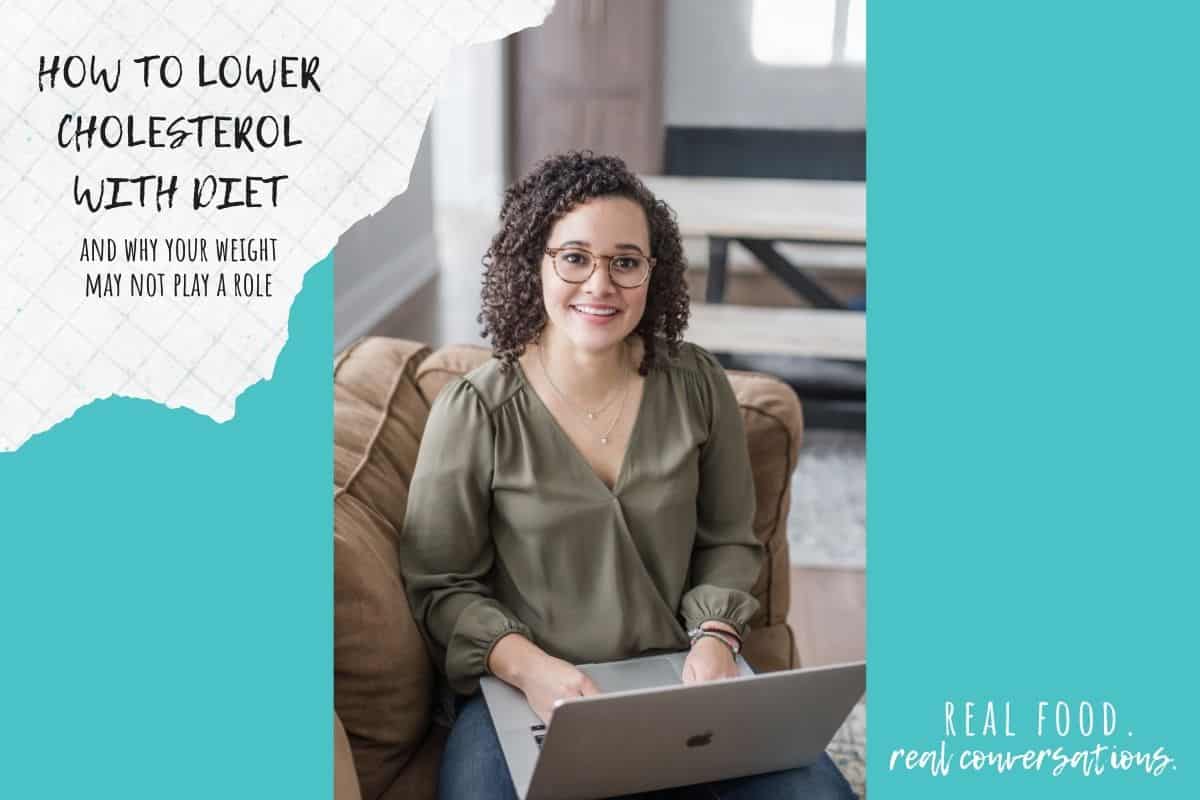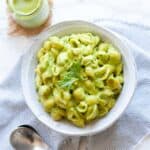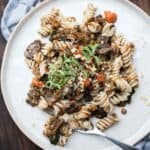Learn how to lower cholesterol with diet changes as our expert guest takes us through all we need to know to live a healthier and happier life!

Overall wellness depends on so many things, but preventing and dealing with chronic disease is an important one.
Veggies Don't Bite started due to wanting to help improve my husbands heart health and high cholesterol played a role. As we moved to a more plant rich diet we saw dramatic improvements!
Podcast: Play in new window | Download | Embed Subscribe now! Apple Podcasts | iHeartRadio | TuneIn | Deezer | RSS | More
Ashley Reaver, MS, RD, CSSD is a registered dietitian with a Master's degree in Nutritional Sciences from Tufts University and an undergraduate degree in Nutrition and Dietetics from Cornell University.
Utilizing her years of work experience in clinical nutrition, outpatient counseling, personalized blood analytics, and education, she developed a program to help individuals lower their cholesterol naturally.
In addition to the course, Ashley sees clients in her private practice in Oakland, CA and teaches nutrition and dietetics courses at University of California, Berkeley. Find her on Instagram @lower.cholesterol.nutrition.
Sign up for her FREE class on how to lower cholesterol!
What is Cholesterol?
Cholesterol is an important compound that our body creates, it is a type of fat that is in the body. All animals create cholesterol.
It is in every single cell in our body. It is part of the membrane, which is the outer layer. We use it to make sex hormones, it goes into our stress hormones, use it to make vitamin D, and use it as a digestive compound to help us break down fats.
95 million adults have what is considered high cholesterol. However, total cholesterol isn't the thing we need to focus on but instead we need to look at the parts that make up high cholesterol.
What is considered high cholesterol?
Cholesterol numbers are combo of High Density Lipoprotein or HDL (known as good cholesterol), Low Density Lipoprotein or LDL (known as bad cholesterol) and triglycerides. Total levels are considered high if they are above 200, but again the combo of the three parts are more important.
LDL is considered high if it is above 130, but is best less than 100. If you have too much LDL for too long it can become dangerous and can cause the build up of plaque in our arteries which can lead to heart attacks and strokes.
For HDL, ideally you want it above 50 for men and above 60 for women. If you have more LDL you want more HDL to pick it up and bring it to the liver and repurpose it as something that won't cause damage to your body. HDL can act as an antioxidant preventing LDL from becoming dangerous.
With triglycerides you also want lower levels. It is the primary form of fat in our body, and also 95% of fats that we eat. Our body stores excess energy in the form triglycerides, so that we have extra to use. That is why you can see them circling around in our blood in a blood test.
The reason the total cholesterol numbers can be deceiving is that you can hav high LDL and low HDL but the total numbers can still be below that 200 threshold but overall still not good.
On the other hand you can also have high HDL and low LDL but still be over that 200 mark and be considered high when in reality you are still good.
Also, depending on what is high or low will depend on what you want to do to help as far as nutrition changes and other support.
Why Does Diet Matter?
Cholesterol is made by our body from anything that provides us calories. If you are eating excess calories that you don't utilize, that surplus can lead to a higher production of cholesterol.
However if you are not eating an excess amount of calories, then restricting calories to lose body weight will not have an impact on cholesterol. Unfortunately many doctors tell people to lose weight as a strategy but that may or may not be the issue.
Nutrients we take in when we are eating protein, fat and carbohydrates can impact how long that cholesterol stays in the body. There are two big nutrients to focus on when it comes to cholesterol: saturated fat and soluble fiber.
Why saturated fat increases cholesterol levels
Saturated fat primarily comes from animals but is also seen in a few plant-based foods. It can lead to increased LDL cholesterol. It is not about complete elimination of saturated fat but more so about being mindful and making sure you don't eat too much.
When LDL is made with high amounts of saturated fat (like those in animal products), it sticks around in our blood stream much longer. LDL travels to all the cells in our body, because they all require cholesterol, and deposit some cholesterol in them. At some point the cells don't need anymore but the cholesterol made from saturated fat sticks around longer so increases our cholesterol levels.
Why fiber helps cholesterol levels
The other important nutrient related to cholesterol is soluble fiber. This is a type of fiber that swells when it comes in contact with water (things like oats, chia seeds, beans). The other type of fiber is insoluble fiber and found in fruits and vegetables, these don't swell in water.
Soluble fiber can reduce the absorption of cholesterol in the blood stream, therefore lowering the levels.
Dietary cholesterol
There is also cholesterol we get from foods we eat, which is called dietary cholesterol. This is from products that come from animals. Because all animals produce cholesterol, all of the products from animals will have cholesterol in them. So meat for example has both dietary cholesterol and has saturated fat. In reality, we absorb about 10% of dietary cholesterol, however we absorb 100% of saturated fat.
So while we don't have to focus as much on the dietary cholesterol we see on foods labels as much as the saturated fat as it has a lower impact, it can add up. So for example, chicken is lower in saturated fat but has dietary cholesterol. If you keep eating chicken all the time because it is lower in saturated fat, the dietary cholesterol will add up.
Quickest Way to Lower Cholesterol
It is hard to study humans over long periods of time since people don't live for hundreds of years, however we can look at populations in areas called Blue Zones. These are areas where people live the longest. These people have lower levels of chronic diseases and the things they all have in common are:
- Eat mostly plants
- Walk a lot
- Don't smoke
- Small amounts of alcohol
- Strong sense of community
So looking at these factors, we can see things we can do to help.
Lowering saturated fat and increasing soluble fiber are the two main factors we should focus on, however reducing smoking and alcohol and increasing our activity is also important.
The other thing to consider is the strong sense of community. Having the connections with others is so important to our mental and physical health.
When it comes to changes, you don't have to make a complete overhaul. Starting small has the most long term impact. Starting simple such as adding beans once a week then growing from there works great.
Activity is also an important piece, moving your body doesn't have to be a 45 minute run. Start small with a 10 minute walk per day.
Mindset is a big part of it, you have to put it in your head that you are in control of the outcome.
Foods to Eat to Lower Cholesterol
When it comes to keeping your LDL cholesterol and triglycerides on the low end, there are many things you can focus on with foods you eat.
As we said already, the two main things to focus on are lowering your saturated fat intake and increasing your soluble fiber intake. But other than that increasing nutrient rich plant foods can help impact your cholesterol in a positive way.
Here are some foods you can incorporate into your diet to help:
- Fruit
- Vegetables
- Beans
- Oats
- Chia seeds
- Healthy fats like nuts and seeds
- Whole grains
Foods to Avoid When You Have High Cholesterol
Saturated fat is the main nutrient you want to avoid. This fat mostly comes from animal based foods but can also be found in some plant based foods.
Three main plant-based foods that have saturated fat are coconut, cocoa and palm oil.
So decreasing the amounts of food you eat with saturated fat will help decrease your LDL cholesterol and triglyceride numbers. Here are some foods to eat less of:
- Meat
- Dairy
- Eggs
- Coconut oil
- Coconut flakes or shredded coconut
- Palm oil (watch for foods like margarine, microwave popcorn, and other convenience foods)
- Cocoa in large amounts

PS- If you liked this episode of Real Food Real Conversations, please subscribe and leave me a review!
And tag me on Instagram whenever you're listening! I reply to all my messages!














Questions or comments? Let me know below!